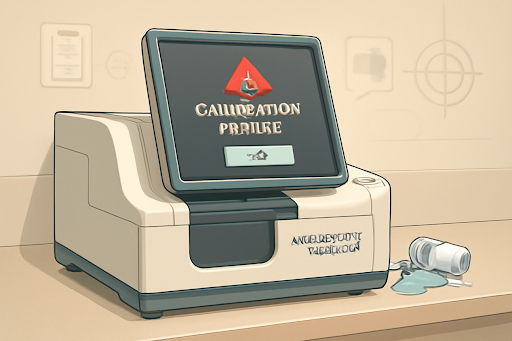

- Home
- Case Study
- Why Calibration Failures Happe ...
In busy hospital labs, speed and accuracy go hand in hand. When more than 500 patients rely on your lab daily, every second counts. That’s why automated biochemistry analyzers are such trusted workhorses—processing hundreds of samples quickly with precision.
But what happens when these systems start showing frequent calibration failures? Suddenly, delays creep in, and patient care slows down. Today, let’s unravel the story behind these calibration hiccups and explore how simple yet essential quality practices make all the difference.
The Puzzle of Calibration Failure
Imagine a medium-sized hospital lab with two rapid biochemistry analyzers cranking out 400 tests per hour each. The lab runs strict quality controls every morning to ensure test results are spot-on.
One Sunday, a problem surfaces—a calibration fails for a few parameters. After repeated attempts, the issue resolves, and testing continues. But over the following days, calibration failures pop up again, sometimes passing on the second try and sometimes not.
What went wrong?
The Hidden Culprit: Calibrator Mix-Up
The lab uses lyophilized calibrators, which they reconstitute, aliquot, and freeze for future use. On one Saturday, staff diluted two vials of the calibrator. The first diluted vial was faulty and caused calibration failure. Without realizing this, the next shift aliquoted the leftover calibrators and stored them together, without proper labeling.
Because the aliquots weren’t marked or segregated by quality status, the faulty calibrator was unknowingly used multiple times, causing ongoing calibration failures and confusion.
Simple Steps to Prevent These Issues
This story highlights crucial lab practices that can make or break quality:
- Follow your SOPs religiously: Label every aliquot clearly with batch details and status.
- Maintain good communication: Always hand over crucial info during shift changes to avoid assumptions.
- Train your team: Everyone diluting or aliquoting calibrators should understand the importance of these steps.
- Monitor your QC data carefully: Early detection of abnormal controls helps catch issues early.
- Keep your storage organized: Prevent mix-ups by segregating aliquots based on quality and date.
Why Calibration Matters
Calibration ensures that your analyzer’s readings match real-world standards. Skipping or botching calibration means patient results might be inaccurate, putting treatment decisions at risk.
Even in high-tech labs, human steps like labeling and communication are vital to keeping machines working flawlessly.
Final Thoughts
Calibration failures don’t have to slow down your lab. With disciplined practices, clear communication, and team accountability, you can keep tests flowing smoothly and keep patients safe.
“Quality is never an accident; it is always the result of intelligent effort.” — John Ruskin
This is Saikat Pal from DailyWel, reminding lab professionals that precision in the little things creates trust in the big picture.
Recent Posts
- Obsessive-Compulsive Disorder (OCD): A Human-Centered Exploration
- Protecting Your Gut: The Dailywell Guide to Understanding Gastritis and Gastropathy
- Comprehensive Insights into Rectal Cancer: Signs, Treatments & Future Perspectives
- Calm Your Pressure: Natural Ways to Control Hypertension Through Meditation and Lifestyle
- Understanding Acne: Causes, Effects, Treatments & Natural Remedies for Clear, Healthy Skin
Recent Comments
Archives
Search
All Tags
Search
Gallery






Recent Post
Obsessive-Compulsive Disorder (OCD): A Human-Centered Exploration
- January 24, 2021
- 4 min read
Protecting Your Gut: The Dailywell Guide to
- January 24, 2021
- 7 min read
Comprehensive Insights into Rectal Cancer: Signs, Treatments
- January 24, 2021
- 6 min read












No Comments